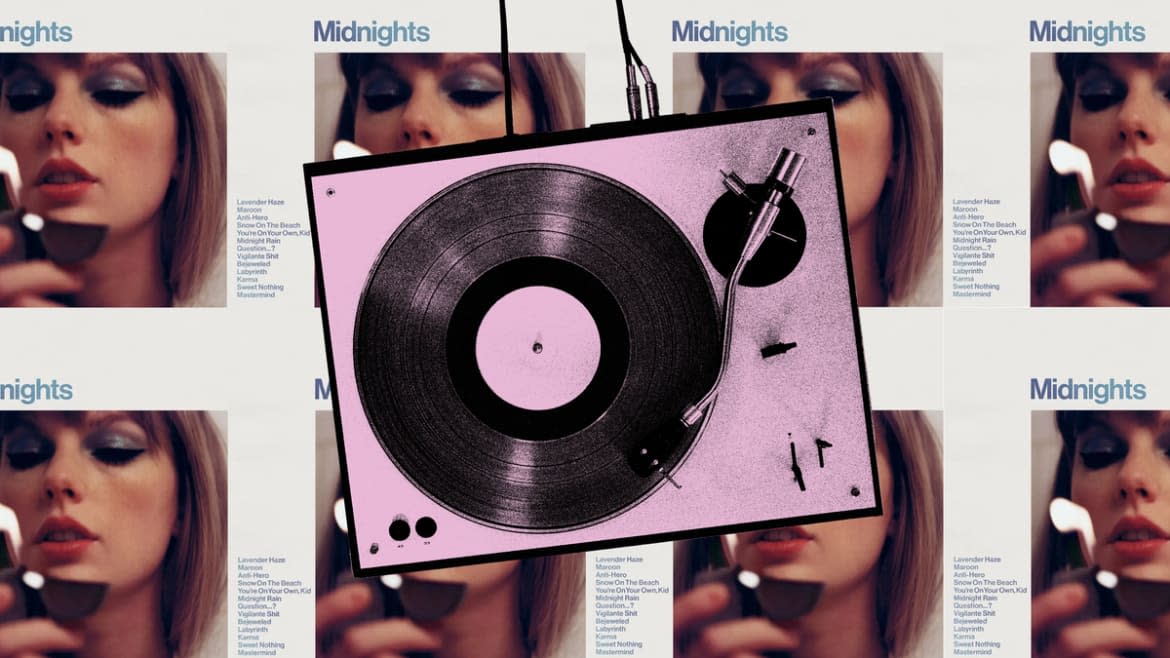Taylor Swift’s ‘Midnights’ Album Is Shockingly Dull

- Oops!Something went wrong.Please try again later.
Believe it or not, Taylor Swift is our most grandiose pop star. That may seem like a stretch in a world where we have Gagas, Beyoncés, and Madonnas, but it’s true. Taylor Swift is a maximalist at heart—she goes for broke every single time and milks everything for all it’s worth. Even the stripped-down, singer/songwriter folk of her pair of pandemic albums, folklore and evermore, was massive in scale; Taylor Swift, the most popular artist in the world, had surprise-released two albums within six months. The world stops whenever her hand grabs the globe.
The songs on those two albums might have seemed smaller and more refined, but it was only because the poppiness that defined her post-2012 albums had been locked away. Listen more closely, and the enormity of the lyrical worlds that Swift made her signature so long ago still remained. Subtlety is not her strong suit. Taylor Swift is all big emotions and breathless declarations; the human version of the feeling you get in the pit of your stomach right after sending a risky text.
Cut to the night of the 2022 VMAs in August, when Swift surprise-announced her new record, Midnights, which was released Friday. In the two months after that announcement, fans waited on the eventual release of a lead single that never came. Instead, she teased out the album’s tracklist in TikTok videos and dropped easter eggs for loyalists to lose sleep over. How appropriate: Midnights, by Swift’s accord, is “the stories of 13 sleepless nights scattered throughout [her] life.”
And in case you forget that the album is about midnights, she’ll remind you—several times throughout its runtime. But the problem with repeating that word over and over is that it’s a constant reminder that, for songs written on or about emotionally fraught, sleepless nights, they lack poignancy and resonance. Most things here feel like a first draft; there’s a noticeable lack of connection between the emotions she’s feeling and what her audience is capable of absorbing.
Taylor Swift’s ‘Midnights’ Easter Egg Is Her Most Complicated Yet
On folklore and evermore, Swift so deftly melded her own experiences with fictional tales, while still creating affecting music that towered over the listener with irrefutable brilliance. Even non-fans went wild over it. But on Midnights, Swift is “out of the folklorian woods” (again, her own words) and back to the shiny, synthy poppiness of 2019’s Lover. The result is an atypical step backward, a record half-finished. The uninspired production and uncharacteristically bland lyricism of Midnights are better left in the pages of a journal or lost in the shadow of a dream.
Lucky for us all, things start strong and stay that way for a while. The Midnights opener, “Lavender Haze,” is an intriguing amalgamation of time periods. The song, named after an old-timey phrase coined for the feeling of falling in love (that, of course, Swift first heard on Mad Men) pairs nicely with the 1970s aesthetic of the album cover and visuals. It’s pure Swiftian pop, with some welcome production flourishes, like a warbling bassline that nicely contrasts against the bombastic chorus.
Also in the album’s better half is “Anti-Hero,” the first proper single off Midnights, with a music video that was released in the wee hours of the morning. It’s sublime, a clever yet melancholic rumination on Swift’s own status as a polarizing figure and her worry that it will eventually drive everyone away. It’s the perfect mixture of wit and emotion, with truly laugh-out-loud lyrics like, “Sometimes I feel like everybody is a sexy baby/And I’m a monster on the hill.”
It’s so wild and silly that you just have no choice but to respect it—the kind of thing that fans will scream in arenas and secret listeners will smirk at, alone in their cars with no one around to see. And when she’s not drawing out a chuckle, she’s getting full-on laughs. How perfect of a picture is, “I have this dream my daughter-in-law kills me for the money, she thinks I left them in the will/The family gathers ’round and reads it and then someone screams out/‘She’s laughing up at us from Hell!’”?
Things, unfortunately, start to go downhill from there. “Vigilante Shit” pours a bucket of 2014-era, Blair Waldorf bad-girl attitude all over the album. “Draw the cat eye sharp enough to kill a man,” Swift says, opening a tepid song about silent revenge with meme speak straight from Tumblr.
The song recalls similar vocal distortion heard on parts of Reputation, but doesn’t have their ambitious production value. Here, Swift lets curse words and references to drugs do the heavy lifting for her. But shocking people with harsher language and a love for Gone Girl does not replace good songwriting. “Vigilante Shit” is the only song on the album without a co-writer, so maybe what Swift says in “Anti-Hero” is right: She should not be left to her own devices.
“Bejeweled” might be a career low, hovering around somewhere next to “ME!” on a list of notorious Taylor Swift album skips. This is chintzy and childish music that’s even stranger if you think about how its ridiculous lyrics wouldn’t fit on any of Taylor’s first three albums—all made when she was a literal teenager. Swift’s delivery of, “Best believe I’m still bejeweled when I walk in the room/I can make the whole place shimmer” is grating and, frankly, annoying. Swift should sell selections like these off to Jojo Siwa and collect a royalty check.
When Taylor used to make these kinds of songs, she was young and humble enough for it to come off as earnest and funny; a sweet delivery that often worked because it was coming from an artist who was genuinely trying to convey something in the exact way she felt it in her bones. On Midnights, it feels so stilted and bizarre, delivered to us almost like a parody. Swift’s worst habit as a songwriter is her inability to drop a clever rhyme or witty lyric and let it land without a knowing wink, confident in her cheekiness and humor.
Other parts of the album aim for experimental, but are pulled back by Swift’s perfectionism. “Midnight Rain” is an engaging song about remembering past loves with distorted vocals and electronic synths that rise and fall like air. And yet, Swift and co-producer Jack Antonoff can’t help themselves from throwing in their beloved trap snares and drums. What if the structure was looser, free-flowing in all directions without the rule book of standard pop production? And what if every time Taylor Swift leaned into something new, she didn’t hesitate?
There’s only one song on Midnights with a featured artist. “Snow On The Beach,” which boasts Lana Del Rey as a guest, is really more of a suggestion than a collaboration. Del Rey has no verses in the song, and doesn’t sing alone on any of the choruses. She’s simply around to provide a dreamy background vocal harmony. But even if a collaboration between two remarkable songwriters isn’t as major as it should be, “Snow On The Beach” succeeds as a lovely, lilting song about the impossible feeling of mutual new love. All of the fake fanfare about getting Lana Del Rey on a track can be forgiven for a lyric like, “Now I’m all for you, like Janet.”
At times, it feels like Midnights has two sides constantly at war—the synthpop Taylor and the one lost in those folklorian woods. Her refusal to step to one side may be an interesting and experimental tactic, but it makes for a discombobulated listening experience. Past works like Reputation and Lover might be divisive among fans, but at least they’re not boring. The album explainer that came alongside its announcement may have been over-the-top (again—here’s our foremost maximalist!), but it evoked a more clear throughline to the emotion than these songs achieve.

But Midnights would not be a Taylor Swift record if at least one song didn’t knock the wind out of you. “You’re On Your Own, Kid” is the perfect fusion of signature Swiftian storytelling, past and present. It’s a slow-burning look back on an infinitesimal early crush, revisited with the knowledge and empathy of Swift’s adult self recreating the potency of teenage emotion.
The lyrics in each chorus change to weave a more intricate tapestry, eventually lighting the fabric of the song on fire with the rage of a sad realization. “I hosted parties and starved my body/Like I’d be saved by a perfect kiss,” she sings in the explosive final chorus alongside perfectly placed drums and a low, distorted synth. It’s a high point in an album too filled with half-baked ideas; here’s our sigh of relief that Swift hasn’t lost her touch.
Taylor Swift is our most sincere pop star, in the respect that she has never tried to be anything that she’s not. Even when she’s dipping into other genres, she’s funneling them through her distinct Swiftian lens—always over the top, poetic, and deeply emotional. For better or worse, she’s herself. And even when the music isn’t very good, her unflappable commitment to doing things exactly the way she wants to is always admirable.
Taylor Swift’s ‘Evermore’ Is as Masterful and Sad as You Hoped and Needed
I often wonder if that’s where the disconnect lies: in the listener’s inability to match her wanton, pink-hued effervescence at a given moment. Swift’s biggest fans rarely have this problem, as their attachment to her as not just an artist, but as an idea, allows their mindset to coalesce with hers during an album cycle. There’s a maturity in Swift’s declaration to stay immature, forever young and always hopeful, infatuated with love and life. But at a certain point, that mindset doesn’t gel with the music.
Songs on folklore and evermore felt like a step forward, so natural as if they poured out of her and couldn’t be stopped. Make no mistake: They were grandiose pop too, only filtered through a new lens to please fans while fooling simpletons who used to brush her off. It was a fun, new stunt in her bag of tricks. But most of Midnights finds Taylor Swift straddling the past and future. It’s strangely stilted, not like a late-night free write but rather a jumble of mismatched ideas. There’s an intensity that Swift is surely capable of that remains just out of reach, like trying to remember a dream that felt so detailed while you were in it, only for it to evade you completely in the light of day. Maybe it’ll come back to her.
Get the Daily Beast's biggest scoops and scandals delivered right to your inbox. Sign up now.
Stay informed and gain unlimited access to the Daily Beast's unmatched reporting. Subscribe now.

